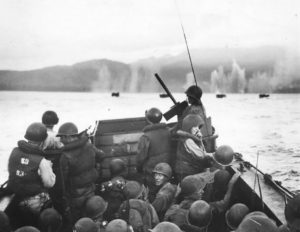Apr. 22 in U.S. military history
 1863: Union cavalry troopers, led by Col. Benjamin Grierson, begin a two-week raid through Mississippi. Grierson’s raiders cut the state’s telegraph lines, destroy two train loads of Confederate ammunition, sabotage 50 miles of railroad, kill 100 and capture 500 Confederates – at the cost of three wounded, seven wounded, and 14 missing.
1863: Union cavalry troopers, led by Col. Benjamin Grierson, begin a two-week raid through Mississippi. Grierson’s raiders cut the state’s telegraph lines, destroy two train loads of Confederate ammunition, sabotage 50 miles of railroad, kill 100 and capture 500 Confederates – at the cost of three wounded, seven wounded, and 14 missing.
1915: German artillery near Gravenstafel, Belgium fires over 150 tons of chlorine gas on French forces, including French Colonial Moroccan and Algerian troops, in the first large-scale successful use of chemical weapons. Within moments, the toxic gas cloud inflicts about 6,000 casualties – including many of the German artillery troops. Some 2,000 Americans alone would die from chemical weapons during World War I, and the deadly new tactic inflicts half a million casualties by war’s end.
1942: The Coordinator of Information (predecessor to the Office of Strategic Services, and ultimately, the CIA) activates Detachment 101 – a special operations unit in Burma. The group collected intelligence, destroyed bridges, derailed trains, captured or destroyed enemy vehicles, located targets for the 10th Air Force, rescued downed Allied airmen, and most importantly, recruited and trained over 10,000 native troops for a highly effective guerrilla campaign against Japanese Forces. Detachment 101 and its OSS teams became the prototype for modern-day Special Forces (Army Green Berets).
1944: American soldiers and Marines, supported by over 200 ships, land in New Guinea for Operations RECKLESS and PERSECUTION, beginning a three month battle that would claim the lives of 12,811 of the heavily outnumbered Japanese troops, compared to only 527 Americans.
1945: As Russian air force and artillery and bombard targets in central Berlin – with some explosions rocking the underground Führerbunker command post – Adolf Hitler confides to his aides that the war is lost and declares suicide is his only option. The Führer will kill himself in eight days.
1951: Chinese and North Korean forces, totalling some 700,000 soldiers, launch their Spring Offensive. The communist assault, which is the last all-out Chinese offensive of the war, inflicts heavy casualties on both sides but fails to accomplish the objective of capturing Seoul and driving UN forces off the peninsula.
2004: Pat Tillman, who left a multi-million dollar career in professional football to join the Army after the 9/11 terrorist attacks, is killed while on patrol in eastern Afghanistan. Pat and his brother Kevin (a minor-league baseball player in the Cleveland Indians organization before enlisting) served in both Iraq and Afghanistan with 2nd Battalion, 75th Ranger Regiment.
[Originally published at OpsLens.com]